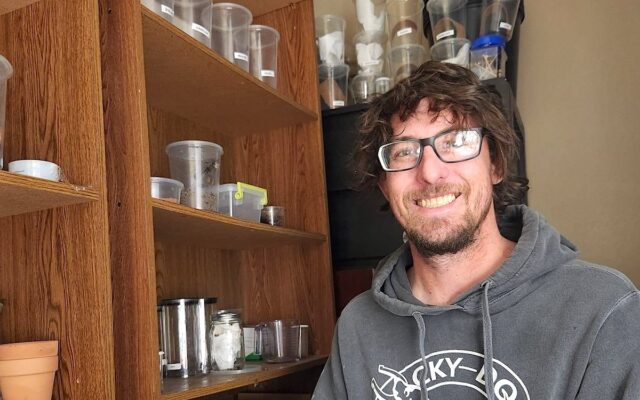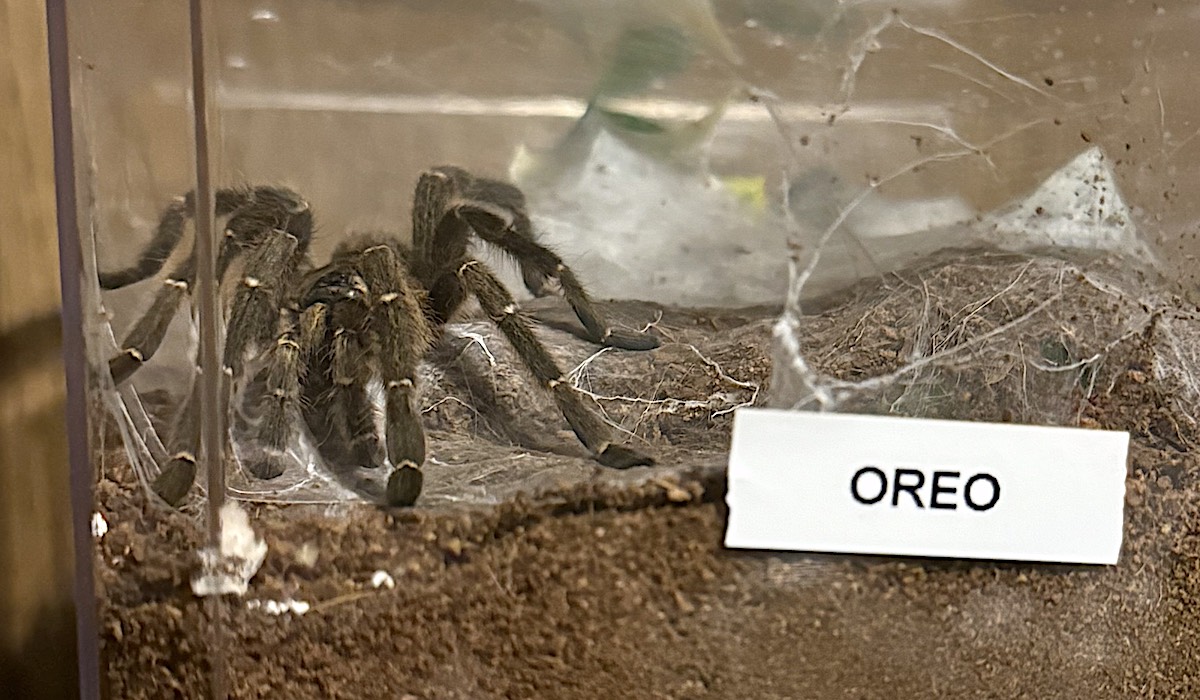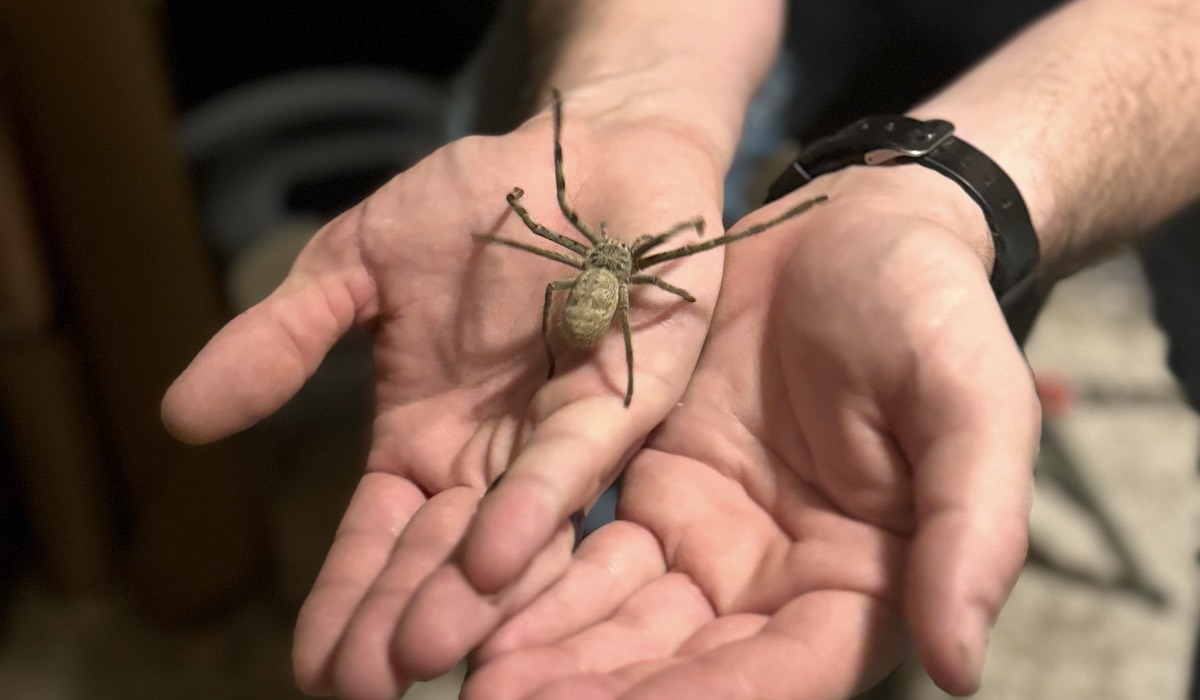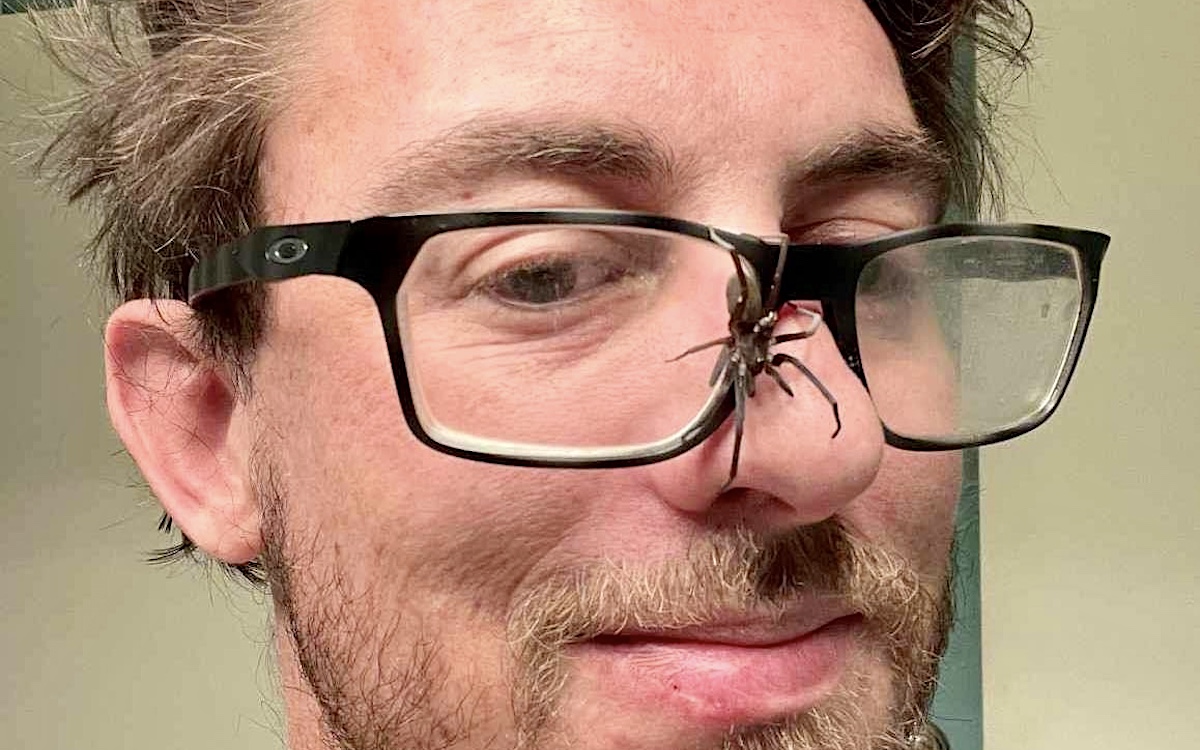
In central Oklahoma, one man’s love of spiders is assisting life-saving research and promoting arachnid companionship. After years of local spider wrangling and casual invertebrate breeding, Nick Krueger has a new company dedicated to his efforts, which have been motivated over the years by various encounters with eight-legged friends.
“People think that spiders are aggressive and want to bite you, and that’s just a huge misunderstanding,” said Nick Krueger, an Edmond native and former kennel technician.
Krueger first started collecting and breeding spiders in 2010, mostly for the pet trade. As his expertise grew, Krueger gradually expanded his practice to include other insects and exotic invertebrates, culminating in the recently established Krueger Spiders and More, a company now officially registered with the Oklahoma secretary of state.
Today, Krueger has a room full of bookshelves in his Edmond home specifically for containers of spiders hailing from Oklahoma to Australia. He also houses feeder insects — such as worms and beetles — that Krueger started breeding to eliminate the cost of feeding the spiders.
“Now that I’m going to start more official breeding, I’m wanting to work with pet stores and stuff and sell locally,” Krueger said. “And [the LLC] makes me feel a little bit more professional.”
Beyond breeding for the pet trade, Krueger has provided venomous spiders — primarily black widows and recluses — to laboratories where venoms are extracted and used for medical research.
“I’ve worked with a venom-extractor company called Spider Pharm, they’re in Arizona,” Krueger said. “They were on an episode of Dirty Jobs with Mike Rowe a long time ago, and I remember seeing that they just had black widows lined to the ceiling.”
Spider Pharm extracts venoms from spiders, centipedes and scorpions for toxin research, according to the company’s website.
Edmond residents often call on Krueger for relocation of venomous spiders they have captured and want to be rid of, he said. While Krueger does not charge to relocate spiders, he will keep the spiders he re-homes as pets or for breeding.
Most of the time, locals contact Krueger for relocations because they have seen his posts in Facebook groups. Krueger helps manage one of them, the Spiders of Oklahoma page, which represents a legion of more than 35,000 avid arachnid afficionados.
“It’s like every day I have at least somebody saying, ‘Hey, I’ve got a black widow or a brown recluse, can you come get it?'” Krueger said. “I’ll normally set it up for the next day, and I’ll just go and grab it, or if they’re close, sometimes they offer to bring it to me. (…) More people than you’d expect jump at the chance to save a spider.”
Into the Spiderverse

Nick Krueger’s family has always loved animals, said his mother, Rose Ann Krueger. Her son’s interest in spiders, however, became an original hobby.
“We always we had a pet snake. It was a red house snake. Both boys loved the snake, and we always had turtles. I save every turtle that I see on the road,” Rose Ann Krueger said. “But I wouldn’t say (we had) spiders and things like that. (…) He just picked that up on his own.”
Nick Krueger said his earliest memory that spawned an interest in spiders involved discovering a brown recluse inside a storm drain when he was in third grade. He decided to take the arachnid home with him.
“My dad had just got home from work, and he held his hand out to see what I had. I opened my hand up, and he was like, ‘Well, that’s a brown recluse. You can’t be holding that,'” Krueger said. “I was like, ‘Well, let’s keep it as a pet.’ (…) I took it to third grade show and tell at school and got sent to the principal’s office.”
Krueger holds no formal education in caring specifically for spiders or other invertebrates, but he has worked in the veterinary field. Much of his expertise, he said, has grown over time through his own research on the critters.
While Krueger regularly handles the spiders he keeps at home — even the venomous widows and recluses — they have never harmed him.
He has been bitten by dangerous spiders in the past, though.
In 2018, while gardening at his house, Krueger reached under an elevated lip of a garden bed. He did not realize a black widow was underneath, and it bit him.
“I realized it like 20 minutes after it happened. I saw a huge red spot on my finger, and it was getting real sweaty-looking and red and inflamed,” Krueger said. “I collected the widow immediately in a cup.”
Krueger took the spider with him to the hospital, a practice recommended any time a person is bitten by a spider, even if it is crushed.
“Even if you squish the spider, still take it with you. Most of the time, hospitals will reach out to a spider expert to figure out what the species is if they’re not familiar with it and just to get a confirmation on ID,” said Cheyenne Gonzales, a wildlife biologist with the Oklahoma Department of Wildlife Conservation. “Black widows, they have a neurotoxic venom, and brown recluses have more of a necrosis type of venom. They have different venom types, so you’re treating it differently.”
For most adults, the black widow venom Krueger was exposed to truly takes effect about an hour after a bite, according to the National Capitol Poison Center. Venoms typically act more quickly and more severely on seniors and children.
After his 2018 bite, Krueger said he had already been examined at and discharged from the hospital by the time stronger symptoms took hold.
“I started getting just terrible, terrible lower back and stomach spasms. It was literally the worst pain I’ve ever experienced, and I’ve had eye surgeries and back surgeries from tumors — and nothing compared,” Krueger said. “It was just extreme pain, and I went almost delusional.”
After a couple of days of pain, Krueger recovered and even decided to keep the spider that bit him as a pet.
“Just to show that we had no hard feelings,” Krueger said.
Follow @NonDocMedia on:
Facebook | X | Text or Email
Arachnid ambassador promotes ‘not being super afraid’

Part of Krueger’s passion for spiders includes dispelling common myths about the creatures being dangerous or looking to bite.
According to Gonzalez, the ODWC wildlife biologist, widows and recluses are the only types of spiders in Oklahoma that can cause concern for humans. Oklahomans are more likely to encounter a recluse, owing to their environmental preferences.
“I had never personally found a Black Widow inside my house, however, that is a spider that you could potentially find in a garage. Same with brown recluses, but I’ve found recluses in my house before,” Gonzalez said. “Both spiders like clutter. They like to be close to the ground.”
Krueger said each of the times he has been bitten by a spider, he had either been reaching somewhere and disturbing a spider’s habitat or moving his hand too quickly and spooking the spider.
The vast majority of other common spiders in Oklahoma, like orb weavers, grass spiders and tarantula species, pose no danger to humans and help control pests around the home, Gonzalez said.
Krueger hopes that exposure to the creatures, like through his Facebook group, will help people feel less frightened by them. For instance, his mother said she has become more comfortable around spiders over time.
“I didn’t like spiders when I was younger, but I’ve actually helped Nick corral baby spiders,” Rose Ann Krueger said. “I guess he’s taught me a lot about not being super afraid of them.”
Based on his business and members of the online community, Krueger thinks more people are opening up to the eight-legged critters.
“More and more people seem to be taking to spiders a little bit, and I don’t know exactly what that is to say, but hopefully it’s something that keeps on going,” Krueger said.





















